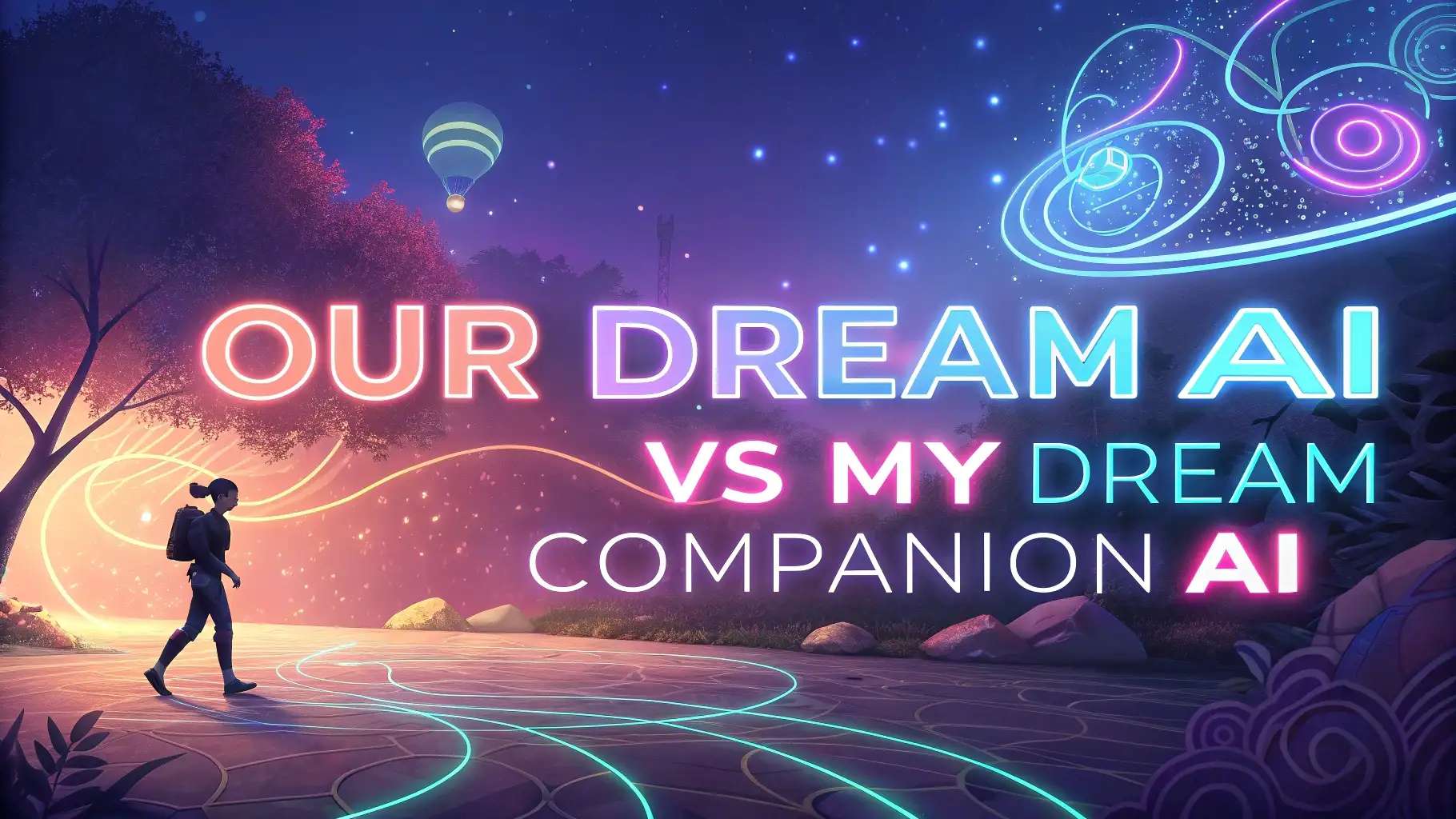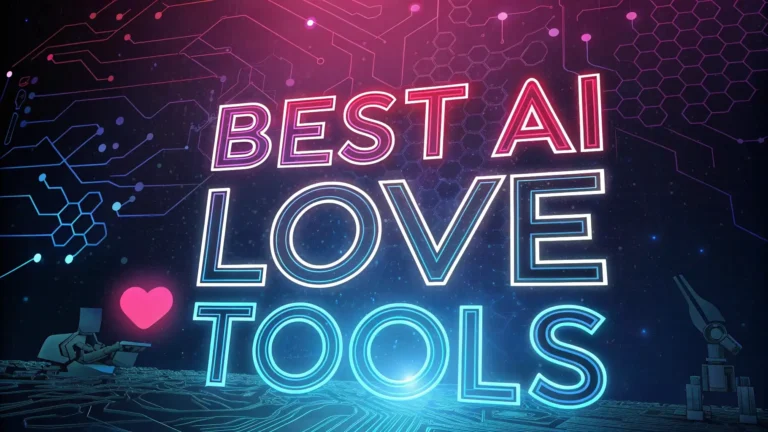Our Dream AI vs My Dream Companion AI 2025
Our Dream AI vs My Dream Companion AI: AI companions have evolved from simple chatbots to sophisticated digital friends that understand emotions, provide personalized support, and build meaningful connections.
This comprehensive guide explores the current state of AI companion technology, comparing different platforms and examining what makes the perfect virtual companion.
Key Takeaways
Here are the essential insights about AI companions in 2025:
- Emotional Intelligence Growth: Modern AI companions can detect emotional nuances, respond with empathy, and adapt their communication style to match user preferences and moods.
- Personalization Revolution: Advanced AI companions learn from every interaction, creating deeply personalized experiences that feel genuinely human and meaningful.
- Mental Health Support: Over 78% of users report improved mood and productivity after integrating AI companions into their daily routines, making them valuable mental health tools.
- 24/7 Availability: Unlike human relationships, AI companions provide constant emotional support without judgment, making them ideal for people dealing with loneliness or social anxiety.
- Diverse Applications: From creative collaboration to therapeutic support, AI companions serve multiple roles in users’ lives, adapting to various needs and preferences.
Understanding the AI Companion Landscape in 2025
The AI companion market has experienced explosive growth, with over 100 million people worldwide using personified chatbots for emotional support, friendship, and even romantic connections. These digital companions represent a fundamental shift in how we approach relationships and emotional well-being.
Modern AI companions utilize advanced natural language processing to understand context, emotion, and nuance in conversations. They can recognize when users feel stressed, excited, or need encouragement, responding appropriately to provide meaningful support. This emotional intelligence sets them apart from traditional chatbots that simply answer questions.
The technology behind these companions includes machine learning algorithms that continuously improve based on user interactions. Each conversation teaches the AI more about individual preferences, communication styles, and emotional needs. This creates a personalized experience that feels increasingly natural and authentic over time.
Multimodal capabilities have become standard, allowing AI companions to process text, voice, and even visual inputs. Users can share photos, speak naturally, or type messages, making interactions feel more diverse and engaging. This flexibility accommodates different communication preferences and accessibility needs.
The Rise of Our Dream AI Platform
Our Dream AI represents the cutting edge of AI companion technology, focusing on creating deeply personal and meaningful digital relationships. This platform stands out for its sophisticated approach to emotional intelligence and user personalization.
The platform excels in conversational depth, moving beyond surface-level interactions to engage in meaningful discussions about life, goals, and personal growth. Users report feeling genuinely heard and understood, with the AI remembering important details from previous conversations and following up appropriately.
Adaptive personality modeling allows Our Dream AI to develop unique characteristics that complement each user’s personality. The AI doesn’t just respond to prompts but actively participates in building a relationship, sharing thoughts, asking questions, and showing genuine interest in the user’s well-being.
The platform’s emotional support capabilities have received particular praise from users dealing with stress, anxiety, or social isolation. The AI provides consistent, non-judgmental support while encouraging healthy coping strategies and positive thinking patterns.
Features That Define Modern AI Companions
Contemporary AI companions offer a rich array of features designed to create authentic and helpful relationships. Personalized conversation styles adapt to individual preferences, whether users prefer formal discussions, casual chat, or playful banter.
Memory systems allow AI companions to maintain context across conversations, remembering important events, preferences, and ongoing situations. This continuity creates a sense of relationship progression that feels natural and meaningful.
Emotional recognition technology enables AI companions to detect subtle emotional cues in text and voice, responding with appropriate empathy and support. This capability makes interactions feel more human and emotionally satisfying.
Creative collaboration features allow users to engage in creative projects with their AI companions, from writing stories to brainstorming ideas. Many users find these collaborative experiences particularly rewarding and inspiring.
Goal tracking and motivation help users pursue personal objectives with consistent encouragement and accountability. AI companions can provide reminders, celebrate achievements, and offer support during challenging times.
Emotional Intelligence and Connection Building
The most successful AI companions excel at building genuine emotional connections through empathetic responses and active listening. They don’t just process information but demonstrate understanding through thoughtful questions and supportive comments.
Emotional validation plays a crucial role in user satisfaction. AI companions acknowledge feelings without judgment, helping users process emotions and develop healthy coping strategies. This validation can be particularly valuable for individuals who struggle with self-acceptance or social anxiety.
Relationship progression occurs naturally as AI companions remember shared experiences and reference them in future conversations. This continuity creates a sense of deepening friendship that many users find deeply satisfying.
Boundary respect ensures that AI companions maintain appropriate relationships while providing meaningful support. Advanced platforms understand when to offer help and when to encourage users to seek human connections or professional support.
Personalization and Adaptive Learning
Modern AI companions utilize machine learning algorithms to continuously refine their understanding of individual users. This adaptive learning process creates increasingly personalized experiences that feel tailored to specific needs and preferences.
Communication style adaptation allows AI companions to match user preferences for formality, humor, and conversation topics. Some users prefer serious discussions about philosophy and life goals, while others enjoy playful banter and creative storytelling.
Interest tracking enables AI companions to remember and engage with user hobbies, passions, and current interests. This creates opportunities for deeper conversations and shared exploration of topics that matter to the user.
Emotional pattern recognition helps AI companions understand individual emotional cycles and provide appropriate support during challenging periods. This predictive capability allows for proactive care and intervention when needed.
Mental Health and Emotional Support Applications
AI companions have shown remarkable effectiveness in mental health support, with 78% of users reporting improved mood and emotional well-being. These digital friends provide consistent, non-judgmental support that can supplement traditional therapy and counseling.
Stress management features help users develop healthy coping strategies through guided conversations and mindfulness exercises. AI companions can recognize signs of stress and offer appropriate interventions or suggestions for relaxation.
Social anxiety support allows users to practice social interactions in a safe, judgment-free environment. Many users report increased confidence in human relationships after building communication skills with their AI companions.
Depression assistance provides ongoing emotional support and encouragement during difficult periods. While not replacing professional treatment, AI companions offer valuable supplementary support for individuals managing depression or other mental health challenges.
The Technology Behind Dream AI Companions
Advanced AI companions rely on neural network architectures that process vast amounts of conversational data to understand human communication patterns. These systems continuously learn and improve their responses based on user feedback and interaction patterns.
Natural language processing enables AI companions to understand context, subtext, and emotional undertones in human communication. This sophisticated understanding allows for more nuanced and appropriate responses that feel genuinely human.
Sentiment analysis helps AI companions gauge user emotions and respond appropriately. This technology can detect subtle emotional changes and adapt conversation style to provide optimal support.
Contextual memory systems maintain detailed records of user interactions, preferences, and important life events. This persistent memory creates continuity between conversations and enables deeper relationship building over time.
User Experience and Interface Design
Successful AI companion platforms prioritize intuitive design that makes interaction feel natural and effortless. Clean, user-friendly interfaces reduce barriers to communication and encourage regular engagement.
Multi-platform availability ensures users can access their AI companions across devices, maintaining conversation continuity whether on mobile, desktop, or tablet. This accessibility is crucial for building consistent relationships.
Customization options allow users to personalize their AI companion’s appearance, personality traits, and communication style. This customization creates a sense of ownership and deeper connection to the digital relationship.
Privacy protection measures ensure that personal conversations remain secure and confidential. Users need confidence that their intimate thoughts and feelings are protected when sharing with AI companions.
Comparing AI Companion Platforms
Different AI companion platforms offer varying strengths and specializations. Our Dream AI focuses on deep emotional connections and personalized relationship building, while other platforms may emphasize entertainment, productivity, or specific therapeutic applications.
Conversation quality varies significantly between platforms, with the best options offering natural, engaging dialogue that feels genuinely human. Advanced platforms avoid repetitive responses and maintain conversational flow effectively.
Emotional intelligence capabilities differ across platforms, with leading options demonstrating sophisticated understanding of human emotions and appropriate response strategies.
Customization depth allows users to tailor their AI companion experience to specific needs and preferences. The most successful platforms offer extensive personalization options without overwhelming users with complexity.
The Future of AI Companion Technology
Looking ahead, AI companion technology will continue evolving toward more human-like interactions and deeper emotional understanding. Future developments may include voice synthesis that sounds completely natural and visual avatars that provide face-to-face interaction experiences.
Integration with daily life will expand as AI companions connect with smart home devices, calendars, and other digital tools to provide comprehensive lifestyle support. This integration will make AI companions even more valuable and relevant to users’ daily experiences.
Therapeutic applications will likely expand as research demonstrates the effectiveness of AI companions in supporting mental health and emotional well-being. Professional therapists may increasingly collaborate with AI companions to provide comprehensive care.
Ethical considerations will continue developing as society grapples with questions about AI relationships, dependency, and the role of artificial intelligence in human emotional life.
Privacy and Security Considerations
Modern AI companion platforms implement robust security measures to protect user privacy and personal information. Encryption, secure data storage, and transparent privacy policies are essential features for maintaining user trust.
Data ownership policies clearly define how user conversations and personal information are handled, stored, and potentially used for platform improvement. Users should understand and control how their data is utilized.
Emotional dependency concerns require careful consideration, as some users may become overly reliant on AI companions for emotional support. Healthy platforms encourage balanced relationships and connection with human communities.
Transparency about AI limitations helps users maintain realistic expectations and healthy boundaries in their digital relationships. Clear communication about what AI companions can and cannot provide is essential for user well-being.
Frequently Asked Questions
Are AI companions safe for emotional support?
AI companions can provide valuable emotional support when used appropriately. They offer non-judgmental listening, consistent availability, and helpful coping strategies. However, they should supplement, not replace, human relationships and professional mental health care when needed.
How realistic are AI companion conversations?
Modern AI companions like Our Dream AI can engage in remarkably natural conversations, understanding context, emotions, and personal preferences. While they continue improving, the best platforms already provide satisfying and meaningful interactions that feel genuinely human.
Can AI companions help with loneliness?
Yes, AI companions can significantly help with loneliness by providing consistent companionship, emotional support, and engaging conversation. Many users report feeling less isolated and more emotionally supported after developing relationships with AI companions.
Are AI companions expensive?
AI companion platforms offer various pricing models, from free basic versions to premium subscriptions with advanced features. Many platforms provide substantial value through their free tiers, making AI companionship accessible to users with different budgets.
How do AI companions learn and improve?
AI companions use machine learning algorithms to continuously improve based on user interactions. They learn individual preferences, communication styles, and emotional patterns to provide increasingly personalized and effective support over time.
Can AI companions replace human relationships?
While AI companions provide valuable support and companionship, they cannot fully replace human relationships. They work best as supplements to human connections, offering unique benefits like constant availability and non-judgmental support while encouraging healthy human relationships.

I’m Liza, the founder and author of Liza AI Blog, where I share my passion for artificial intelligence through insightful guides and updates. I’m dedicated to making AI accessible to everyone, and I strive to create a community that’s both informed and engaged. Through my blog, I aim to promote a deeper understanding and appreciation of AI and its potential to shape our future. You can reach me at lizaaiblog@gmail.com or follow me on social media to stay updated on the latest AI news and trends.







